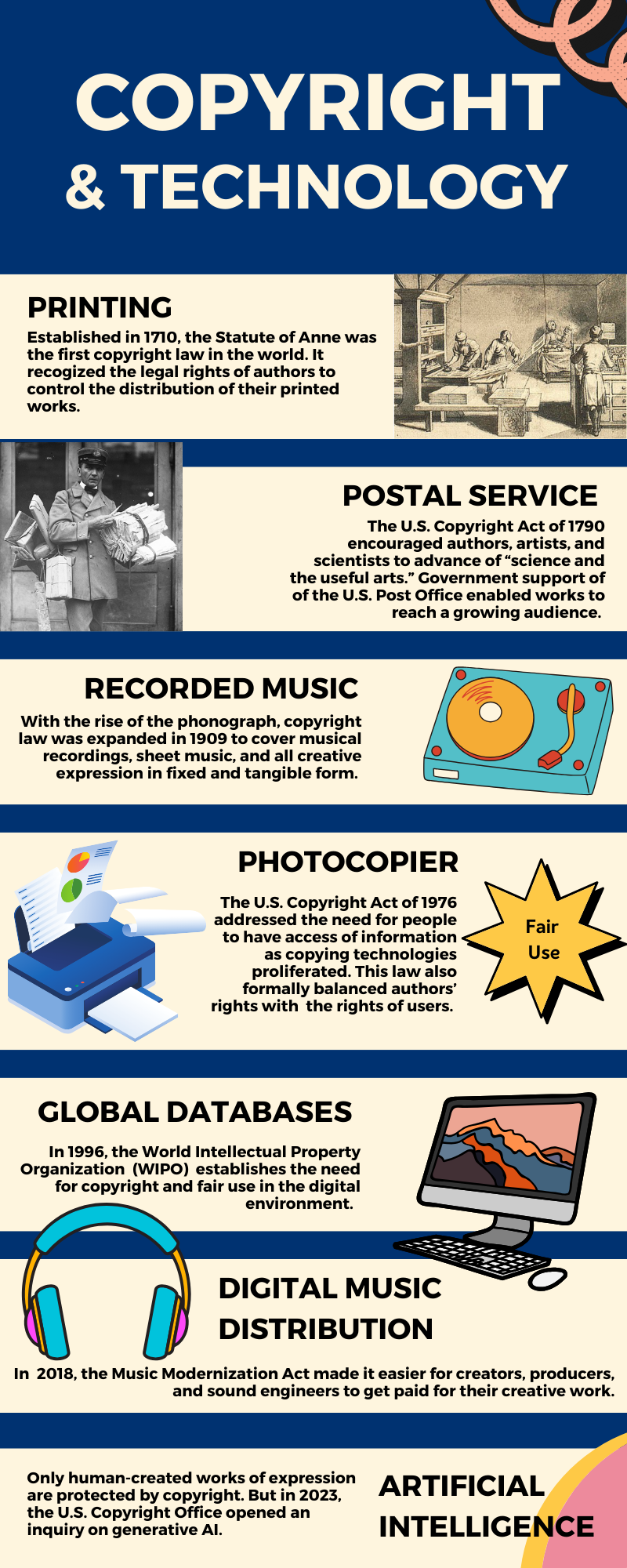Copyright is important in the digital world to protect creators and their work from unauthorized use and distribution, ensuring fair compensation and encouraging innovation. The rapid growth of digital technology and the internet has made it easier than ever to copy and distribute digital content without permission.
This puts creators at risk of losing control over their work and financial opportunities. Copyright provides legal protection, allowing creators to claim ownership, control the use of their work, and receive recognition and monetary benefits. As the digital landscape continues to evolve, copyright becomes increasingly critical for protecting intellectual property rights and fostering creativity in the digital world.
Table of Contents
Evolution Of Copyright
The evolution of copyright has been closely intertwined with the advancement of technology and the digital landscape. With the transition from print to digital media, the concept of copyright has undergone significant transformations, giving rise to new challenges and complexities in safeguarding intellectual property rights.
From Print To Digital
The traditional model of copyright protection was primarily designed to regulate the reproduction and distribution of printed materials such as books, newspapers, and magazines. However, the emergence of digital platforms and the internet has revolutionized the consumption and dissemination of information and creative works.
The transition from print to digital media has necessitated a reevaluation of copyright laws and regulations to address the unique challenges posed by the online environment.
Challenges In The Digital Age
In the digital age, the proliferation of online content sharing and the ease of duplicating and distributing digital assets have posed significant challenges to copyright enforcement. The unrestricted nature of the internet has made it increasingly difficult to monitor and control the unauthorized dissemination of copyrighted materials, leading to rampant instances of infringement and piracy.
Furthermore, the global interconnectedness facilitated by digital technology has blurred the boundaries of jurisdiction, making it more challenging to enforce copyright laws across different countries and regions.
Digital Piracy
In the digital world, copyright plays a crucial role in protecting creators’ intellectual property from piracy. Digital piracy undermines the value of original content and hinders creators’ ability to earn a fair income from their work. It is essential to enforce copyright laws to safeguard creative industries and promote innovation.
Introduction: Digital Piracy
Digital piracy refers to the unauthorized reproduction and distribution of digital content, including music, movies, games, and software. With the advent of the internet, it has become increasingly easy for individuals to engage in this illegal activity, resulting in numerous implications for both the creators of the content and society as a whole.Impact On Creative Industries
Digital piracy has a profound impact on creative industries, posing a significant threat to their sustainability and growth. Here are some key ways in which digital piracy affects these industries: 1. Loss of Revenue: Pirated copies of digital content are freely available online, depriving content creators of their rightful earnings. Artists, musicians, filmmakers, and other creative professionals invest substantial time, effort, and resources into producing high-quality content. When their work is illegally distributed without their consent, they lose the ability to monetize their creations, undermining their incentive to produce more innovative and valuable content. 2. Limiting Innovation: Piracy discourages creativity and innovation. Why invest time and money into developing unique ideas and content when they can be easily stolen? The fear of piracy stifles the creative process, deterring creators from exploring new avenues and experimenting with novel concepts. This ultimately affects the diversity and quality of content available to consumers. 3. Job Losses: The financial repercussions of digital piracy extend beyond the creators themselves. When the revenue streams of creative industries dwindle, job opportunities within these sectors also suffer. From technicians to marketers and distribution professionals, numerous individuals rely on the success of creative industries to sustain their livelihoods. The frequency and extent of piracy directly impact the number of jobs available, posing a threat to the overall economy.Legal And Ethical Implications
Digital piracy not only violates copyright laws but also raises legal and ethical concerns that go beyond financial ramifications. The following points highlight the broader implications of engaging in digital piracy: 1. Violation of Intellectual Property Rights: Copyright laws exist to protect the intellectual property rights of content creators. By engaging in digital piracy, individuals infringe upon these rights, disregarding the legal frameworks put in place to safeguard intellectual property. This undermines the incentive for creators to continue producing original and valuable content. 2. Ethical Considerations: Engaging in digital piracy raises ethical questions surrounding the concept of fairness and respect for the rights of others. Consuming pirated content may save money in the short term, but it undermines the livelihoods of creators who deserve compensation for their work. Supporting piracy perpetuates a cycle of exploitation that is detrimental to the artistic and creative community. 3. Cybersecurity Risks: Downloading pirated content often involves accessing unauthorized websites or using unverified sources, which poses significant cybersecurity risks. Pirated files are notorious for containing malware, viruses, and other malicious software that can infect computers and compromise sensitive personal information. Digital piracy is a global issue that requires collective awareness and action. It is crucial for individuals to recognize the importance of copyright in the digital world and understand the detrimental impact piracy has on creative industries, legal systems, and society as a whole.Protection Of Intellectual Property
Welcome to our blog post on the importance of copyright in the digital world. In today’s technologically advanced society, protecting intellectual property has become even more crucial. In this section, we will explore the various reasons why copyright plays a significant role in safeguarding creative works.
Ensuring Fair Compensation
One of the primary reasons why copyright is important in the digital world is its role in ensuring fair compensation for creators. When individuals invest their time, effort, and resources into producing original content, they deserve to reap the benefits of their work. Copyright provides creators with the legal rights to control how their intellectual property is used and allows them to monetize their creations through licensing or selling.
Creative professionals, such as musicians, filmmakers, and authors, rely on the income generated from their works to sustain their careers and livelihoods. By protecting their intellectual property, copyright enables these individuals to receive fair compensation for their creative endeavors. Without copyright, it would be far easier for others to exploit and profit from someone else’s hard work, leading to an unfair and unsustainable system.
Preventing Unauthorized Use
Another key aspect of copyright in the digital world is its ability to prevent unauthorized use of creative works. With the rise of the internet and digital technologies, it has become incredibly simple to copy, distribute, and reproduce content instantly. While this accessibility has its advantages, it also creates a significant risk of copyright infringement.
Copyright acts as a deterrent against unauthorized use, discouraging individuals from reproducing or distributing copyrighted content without permission. When an original work is protected by copyright, it gives the creator the power to control how their content is shared and used by others. This control prevents unauthorized individuals or organizations from profiting from someone else’s work or claiming it as their own.
Moreover, copyright also encourages the development of new and innovative content. Creators are more likely to invest their time and resources into producing original works when they have legal protection against unauthorized use. It promotes a creative and competitive environment where individuals are rewarded for their ingenuity, fostering a sustainable ecosystem for the production of high-quality content.

Credit: mediaeducationlab.com
Global Copyright Laws
In today’s digital world, global copyright laws play a crucial role in protecting the rights of creators and ensuring that their work is not exploited without permission. With the ease of sharing content online, the need for robust international copyright regulations has become more pressing than ever.
International Copyright Treaties
International copyright treaties serve as the cornerstone of global copyright laws, harmonizing the protection of intellectual property across different countries. Treaties like the Berne Convention and the WIPO Copyright Treaty establish minimum standards for copyright protection that member countries must adhere to, thereby fostering a more consistent and equitable approach to safeguarding creators’ rights worldwide.
Challenges In Enforcement
Despite the presence of international copyright treaties, enforcement of copyright laws faces significant challenges in the digital realm. The borderless nature of the internet makes it difficult to regulate the unauthorized distribution and use of copyrighted material across jurisdictions. Piracy, digital infringement, and the emergence of new technologies further complicate the task of enforcing copyright laws on a global scale.
Future Of Copyright
In the rapidly evolving digital world, the future of copyright is crucial to protecting creators’ rights and fostering innovation.
Technological Advancements
The advancement of technology presents challenges and opportunities for copyright protection.
- Advances like AI and blockchain technology impact how content is created, shared, and protected.
- Copyright laws must adapt to new technologies to safeguard intellectual property in the digital age.
Balancing Access And Protection
Finding a balance between access to content and protection of creators’ rights is essential.
- Ensuring fair use provisions allow for the sharing of content while respecting copyright holders.
- Creative Commons licenses enable creators to specify how their work can be shared and used.

Credit: www.bizlawuk.co.uk

Credit: walledculture.org
Frequently Asked Questions For Why Is Copyright Important In The Digital World
Why Is Copyright Important For Digital Content?
Copyright protects creators’ work, promoting innovation and ensuring rightful credit and compensation.
What Happens If Copyright Is Violated Online?
Online copyright violations can lead to legal actions, penalties, and damages for unauthorized usage.
How Can Individuals Protect Their Digital Copyrights?
Individuals can protect their digital copyrights by registering with copyright offices and utilizing legal agreements.
Conclusion
In the digital age, copyright is crucial for protecting creativity and fostering innovation. It safeguards the rights of content creators and ensures fair compensation. By respecting copyright laws, we uphold ethical standards and contribute to a vibrant, diverse cultural landscape.
Embracing copyright in the digital world benefits both creators and consumers, fostering a balanced ecosystem of creativity.

Leave a Reply